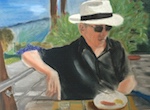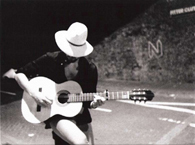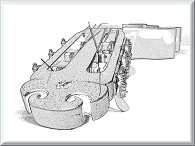Welcome to one of the most active flamenco sites on the Internet. Guests can read most posts but if you want to participate click here to register.
This site is dedicated to the memory of Paco de Lucía, Ron Mitchell, Guy Williams, Linda Elvira, Philip John Lee, Craig Eros, Ben Woods, David Serva and Tom Blackshear who went ahead of us.
We receive 12,200 visitors a month from 200 countries and 1.7 million page impressions a year. To advertise on this site please contact us.
|

|
|
RE: Focal Dystonia.
|
You are logged in as Guest
|
|
Users viewing this topic: none
|
|
Login  | |
|

  
Piwin
Posts: 3563
Joined: Feb. 9 2016

|
 RE: Focal Dystonia. (in reply to Ricardo) RE: Focal Dystonia. (in reply to Ricardo)
|
|
|
I have a hard time following you here.
Aren't psychological issues also sometimes dealt with by "rewiring" the brain? (behavioralist psychology I think?).
My impression, admitedly as a lay-person, is that the lines between these fields of science are increasingly blurred. A while back I read an interesting article on how stretching works. In the past research had focused mainly on what happens to the muscles when you stretch them. Now, they seem to be paying attention to the role that brain may play in it, starting out with the observation that there is some degree of correlation between how stressed a person feels and overall elasticity of the body. In a nutshell, the idea was that stretching doesn't just work on the muscles, but it also habituates your brain to be more comfortable with certain ranges of movement (convince it that "it's ok" if your legs go that far out, for instance).
I would agree though that there are most likely different causes to what is being called focal dystonia. In that sense it is no different than cancer, which is really a spectrum of diseases that got lumped into one. And if treatments are getting better and better, it's because doctors and researchers have recognized this and adapted the treatments they propose to the various underlying causes of the disease. I suspect the same will be true with focal dystonia the more we find about its causes.
_____________________________
"Anything you do can be fixed. What you cannot fix is the perfection of a blank page. What you cannot fix is that pristine, unsullied whiteness of a screen or a page with nothing on it—because there’s nothing there to fix."
|
|
|
|
REPORT THIS POST AS INAPPROPRIATE |
Date Dec. 21 2016 6:09:16
 |
|

   
orsonw
Posts: 1935
Joined: Jul. 4 2009
From: London

|
 RE: Focal Dystonia. (in reply to Ricardo) RE: Focal Dystonia. (in reply to Ricardo)
|
|
|
quote:
One is about a state of mind, vs something physically wrong with the brain and wiring. Years ago when the discussion was hot topic material, I pointed out a list of 4 things people seemed to describe based on symptoms and treatments, and that these 4 things couldn't really be all the same thing called "focal dystonia". Folks ignored me about and everybody seem to be the doctor regarding this topic. To me, if these be psychological issue than it is a form of performance anxiety and should be dealt with as such. If it be a neurological issue, a special type of therapy is required in order to rewire the brain and fingers. Hence we are dealing with similar symptoms but not the concensus diagnosis and treatment.
This is not the right forum for in depth discussion but here is a short answer.
It is not either or. Our 'state of mind' has a physical reality. 'State of mind' changes the 'wiring' as you put it.
Our deep understanding of how movement emerges, is organised and controlled is lacking. Therefore it's not surprising that focal dystonia is not that well understood. However it is becoming clear that movement emerges out of a complex organism, influenced by many factors as well as bio-mechanical ones e.g. psychological/social context, internal/external environment.
For each individual with a movement limitation such as focal dystonia some factors will be more or less important and treatment will need to be individualised accordingly. Therefore treatment that works for one may be have a different emphasis than for another.
Here is an easy to read review of focal dystonia. The risk factors include previous injury, biomechanics, sensorimotor as well as psychosocial ones. E.g one person suffered a hand/nerve injury triggering focal dystonia, another perfectionistic practice. However psychosocial factors will be present to some degree in all. Unless you are dead and someone is pulling on the tendons in your cadaver, movement emerges from the organism as a whole.
https://www.ncbi.nlm.nih.gov/pmc/articles/PMC3580790/
Another relatively easy read review of current theories of motor control and an interesting one on the effect of motor system on perception for those interested:
http://citeseerx.ist.psu.edu/viewdoc/download?doi=10.1.1.723.8464&rep=rep1&type=pdf
https://pdfs.semanticscholar.org/cc0b/6d84737dae6b046eca1d72c0419d75ac5030.pdf
|
|
|
|
REPORT THIS POST AS INAPPROPRIATE |
Date Dec. 21 2016 10:04:01
 |
|

  
Ruphus
Posts: 3782
Joined: Nov. 18 2010

|
 RE: Focal Dystonia. (in reply to rombsix) RE: Focal Dystonia. (in reply to rombsix)
|
|
|
Next time, before putting it in the pan, try stretching your steak or filet. Muscles can´t really be stretched in the sense of dimensionally prolonging a muscle. Only muscle-prolonging exercises can in the long term, by adding cells lengthwise (like with exercises I´ve described in the past).
Stretching thus, apart from a number of minor side-effectsis, is rather useless, .
Regarding state of mind, I´d like to think that a student with a lecturing example of relaxed and fluent technique, hence an adapted imagination of seamless perfromance will hardly be prone to something like FD, for him not getting stuck in counter acting apparatus / simultaneously active antagonists / neural overload /misprinting in cortex.
Rather who is expecting advance through overcoming (erringly located) limit in speed or in fluency by force / cramping and sustained repetition of such method (like me unfortunately in a past period of time) may be provoking FD.
With a firm premise of avoiding superfluous contraction / muscle engagement (whether of a muscle actually needed for a movement or of muscles that should be passive / suspended) a musician should not be risking FD.
Students given an imagination of smooth execution should be doing great.
So, in the end could it all be be bound to what´s in one´s head / anticipation? I think so, indeed.
Ruphus
|
|
|
|
REPORT THIS POST AS INAPPROPRIATE |
Date Dec. 21 2016 13:21:59
 |
|

   
Ricardo
Posts: 14825
Joined: Dec. 14 2004
From: Washington DC

|
 RE: Focal Dystonia. (in reply to rombsix) RE: Focal Dystonia. (in reply to rombsix)
|
|
|
quote:
ORIGINAL: rombsix
quote:
One is about a state of mind, vs something physically wrong with the brain and wiring.
Look up "encephiatrics".
PSYCHIATRY and neurology merging or not debate it seems. Sure one day, EVERYTHING can merge into a single framework discipline, including particle physics and cosmology and chemistry, but till then we need to keep things separate IMO.
As for guitarists with FD, those recent articles make it all look like a huge mess of confusion for doctors AND patients IMO. It seems FD is a symptom, it could have many different causes, and varying formations of "illness" or "disease" description, with wildly varying options for treatment. Horrifying IMO. Cancer as the analogy above doesn't work IMO, because regardless of the manifestation or causes, the disease and it's treatment are clear....abnormal cells growing and a need to kill them. I am sure there are better analogies for FD's weirdness.
_____________________________
CD's and transcriptions available here:
www.ricardomarlow.com
|
|
|
|
REPORT THIS POST AS INAPPROPRIATE |
Date Dec. 22 2016 14:57:52
 |
|

   
machopicasso
Posts: 973
Joined: Nov. 27 2010

|
 RE: Focal Dystonia. (in reply to Pingaloka) RE: Focal Dystonia. (in reply to Pingaloka)
|
|
|
I ran across an interesting article recently published in Brain Sciences on a treatment for focal dystonia. Here's the abstract:
"A sensory trick is a specific maneuver that temporarily improves focal dystonia. We describe a case of musician's dystonia in the right-hand fingers of a patient, who showed good and immediate improvement after using an electrical stimulation-mimicking sensory trick. A 49-year-old professional guitarist presented with chronic involuntary flexion of the right-hand third and fourth fingers that occurred during guitar performances. Electrical stimulation with a frequency of 40 Hz and an intensity of 1.5 times the sensory threshold was administered on the third and fourth fingernails of the right hand, which facilitated fluent guitar playing. While he played guitar with and without electrical stimulation, we measured the surface electromyograms (sEMG) of the right extensor digitorum and flexor digitorum superficialis muscles to evaluate the sensory-trick-like effects of electrical stimulation. This phenomenon can offer clues for developing electrical stimulation-based treatment devices for focal dystonia. Electrical stimulation has the advantage that it can be turned off to avoid habituation. Moreover, the device is easy to use and portable. These findings warrant further investigation into the use of sensory stimulation for treating focal dystonia."
Nishida, Daisuke; Mizuno, Katsuhiro; Takahashi, Osamu; Liu, Meigen; Tsuji, Tetsuya;
Brain Sciences (2076-3425) vol: 13, issue 2, 2023, pp. 223-227
|
|
|
|
REPORT THIS POST AS INAPPROPRIATE |
Date Jul. 1 2023 4:13:30
 |
|

   
Ricardo
Posts: 14825
Joined: Dec. 14 2004
From: Washington DC

|
 RE: Focal Dystonia. (in reply to machopicasso) RE: Focal Dystonia. (in reply to machopicasso)
|
|
|
“Practice makes Permanent, not Perfect”.
Let me “zap” my fingers before I hit the stage. Also it is too cold to play in this hall, I need hand/finger warmers. Actually, a hit of marajuana/bump of coke/shot of tequila usually does the trick…
All this points to performance anxiety to me, and probably needs to be dealt with as such. They way I have worked on it over the years was with the music itself. Also, I had mentioned years ago about vitamin D. My doctor said they don’t know why it helps but it improves many strange issues. I did an experiment when I ran out of my D supplements. I was fine for a few weeks and then noticed something in my fingers after I had long forgotten I had stopped taking them. So there is something physical going on there, I certainly recommend a serious regimen of D supplements, especially musicians that work at night.
Horrifying quote by Paco de Lucia, one that I live by, as terrible as it is: “If you think you are going to make a mistake, you are LOST!”.
Digging myself out of that “hole” of feeling like at any moment it was gonna fall apart, was the key to arriving at a place where everything feels more than “easy”, rather, it is fun.
_____________________________
CD's and transcriptions available here:
www.ricardomarlow.com
|
|
|
|
REPORT THIS POST AS INAPPROPRIATE |
Date Jul. 1 2023 16:48:45
 |
|
 New Messages New Messages |
 No New Messages No New Messages |
 Hot Topic w/ New Messages Hot Topic w/ New Messages |
 Hot Topic w/o New Messages Hot Topic w/o New Messages |
 Locked w/ New Messages Locked w/ New Messages |
 Locked w/o New Messages Locked w/o New Messages |
|
 Post New Thread
Post New Thread
 Reply to Message
Reply to Message
 Post New Poll
Post New Poll
 Submit Vote
Submit Vote
 Delete My Own Post
Delete My Own Post
 Delete My Own Thread
Delete My Own Thread
 Rate Posts
Rate Posts
|
|
|
Forum Software powered by ASP Playground Advanced Edition 2.0.5
Copyright © 2000 - 2003 ASPPlayground.NET |
0.125 secs.
|


 Printable Version
Printable Version








 )
) 





 New Messages
New Messages No New Messages
No New Messages Hot Topic w/ New Messages
Hot Topic w/ New Messages Hot Topic w/o New Messages
Hot Topic w/o New Messages Locked w/ New Messages
Locked w/ New Messages Locked w/o New Messages
Locked w/o New Messages Post New Thread
Post New Thread